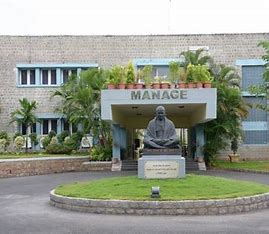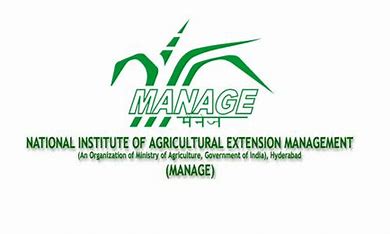
National Institute of Agricultural Extension Management (MANAGE)

National Institute of Agricultural Extension Management (MANAGE)
Address:
National Institute of Agricultural Extension Management (MANAGE)
Rajendranagar, Hyderabad,
Telangana – 500 030,
India
Postal Code (ZIP Code):
500 030
About National Institute of Agricultural Extension Management (MANAGE)
The National Institute of Agricultural Extension Management (MANAGE), located in Hyderabad, Telangana, is a premier national-level institution dedicated to the development and promotion of agricultural extension management in India. Established in 1987 by the Ministry of Agriculture and Farmers Welfare, Government of India, MANAGE is tasked with strengthening the agricultural extension system in the country by providing training, capacity building, research, and policy support in agricultural management. The institute focuses on improving the effectiveness of agricultural extension services, enhancing the livelihood of farmers, and promoting sustainable agricultural practices.
Agricultural extension is critical to the success of agricultural development programs, as it acts as the bridge between farmers and the government, providing farmers with the information, skills, and technologies needed to improve productivity, adopt new innovations, and manage agricultural risks effectively. MANAGE plays a key role in training agricultural professionals and extension workers who, in turn, work with farmers to improve agricultural practices, boost farm productivity, and ensure food security. The institution also focuses on research and policy development that impacts rural development, poverty alleviation, and rural entrepreneurship.
The mission of MANAGE is to strengthen the agricultural extension system in India and contribute to the sustainable growth of agriculture by improving the delivery of extension services, building capacities, and fostering innovations in agriculture.
History and Formation of MANAGE
The need for a dedicated institution to focus on agricultural extension management in India was realized during the 1980s when India’s agricultural sector was undergoing significant changes, marked by increasing demand for modern farming practices and technologies, rural development programs, and more effective delivery of agricultural services to farmers. The Government of India identified the need for an institute that could provide training to agricultural extension officers and professionals to enhance their skills in effectively implementing agricultural programs and improving productivity.
As a result, MANAGE was established under the leadership of the Ministry of Agriculture and Farmers Welfare to address these challenges. Over the years, MANAGE has grown into a leading institution for agricultural extension training and research, offering innovative solutions and strategies for better extension practices and rural development.
MANAGE’s primary focus has been to improve the skills and competencies of agricultural extension officers, facilitate the transfer of technology from research institutions to the field, and support rural entrepreneurship through capacity building. The institute also provides strategic policy recommendations and conducts research on the effectiveness of agricultural extension services.
Mission and Vision
Mission:
MANAGE’s mission is to provide training, research, and policy advocacy to enhance the effectiveness of agricultural extension services in India. The institute aims to improve the capacity of extension officers, foster innovation in agricultural practices, and create an enabling environment for agricultural growth through better management practices.
Vision:
The vision of MANAGE is to be a global leader in agricultural extension management, promoting knowledge transfer, innovation, and sustainable agricultural practices. It envisions a future where agricultural extension services effectively empower farmers to increase productivity, achieve economic prosperity, and contribute to national food security and rural development.
Research and Areas of Focus
MANAGE’s work covers a wide range of topics that aim to improve agricultural extension systems, enhance the effectiveness of rural development programs, and foster innovation in agriculture. Some of the key areas of focus at MANAGE include:
- Agricultural Extension Systems and Practices:
At the core of MANAGE’s mission is strengthening agricultural extension systems. The institute focuses on modernizing and improving the delivery of extension services to farmers by integrating innovative tools, technologies, and practices. MANAGE advocates for participatory extension systems that involve farmers in decision-making processes and encourage the use of Information and Communication Technology (ICT) for effective extension delivery. Through its research, MANAGE has helped design efficient extension models, such as ICT-enabled extension, farmer-led extension, and public-private partnerships in extension. - Capacity Building and Training:
One of MANAGE’s primary functions is capacity building and training. The institute offers training programs, workshops, and fellowships for agricultural extension officers, government officials, and farmers to enhance their skills in areas such as crop management, pest control, post-harvest management, rural entrepreneurship, and rural development. The training programs focus on hands-on learning, providing practical knowledge and skills that can be directly applied in the field. MANAGE also organizes specialized training for the development of leadership skills among extension officers and farm leaders to improve extension outreach. - Farmer Education and Technology Transfer:
A significant aspect of agricultural extension is the transfer of knowledge and technologies from research institutions to farmers. MANAGE plays an instrumental role in facilitating the dissemination of agricultural innovations, best practices, and research findings. The institute supports the development of training materials, extension tools, and information platforms to make the knowledge accessible to farmers, especially in remote and underserved regions. MANAGE also works on the promotion of sustainable agricultural practices such as organic farming, soil health management, water conservation, and climate-smart agriculture. - Rural Development and Livelihood Enhancement:
MANAGE is deeply involved in rural development, focusing on improving the livelihood of rural populations through capacity-building initiatives. It supports rural entrepreneurs, particularly in agricultural sectors such as agri-business, food processing, agro-tourism, and value-added products. By empowering rural communities through entrepreneurship development programs, MANAGE helps farmers and rural youth create sustainable livelihoods and contribute to local economic growth. The institute also works on enhancing access to financial services for farmers, providing training on micro-finance, insurance schemes, and government support programs. - Climate-Smart Agriculture and Risk Management:
Climate change poses significant risks to agriculture, and its impacts on food production are a growing concern. MANAGE conducts research on climate-smart agriculture to mitigate the adverse effects of climate change on farming systems. This includes promoting the adoption of drought-resistant crops, improving water-use efficiency, and implementing soil conservation measures. The institute also focuses on risk management strategies for agriculture, helping farmers understand and adapt to climate variability, market volatility, and pest outbreaks. - Agricultural Policy and Advocacy:
MANAGE plays an important role in formulating and advocating for agricultural policies that enhance the effectiveness of agricultural extension services. The institute works closely with the Government of India, state governments, and international agencies to influence policy changes that improve agricultural productivity, rural development, and farmer welfare. It conducts policy research, provides technical expertise, and advocates for policies that promote sustainable agricultural practices, inclusive development, and technological innovation. - Public-Private Partnerships in Extension Services:
As part of its efforts to innovate and enhance the reach of agricultural extension services, MANAGE encourages public-private partnerships (PPP). The institute works with agribusiness companies, non-governmental organizations (NGOs), and other stakeholders to create synergies for delivering effective extension services. Through these partnerships, MANAGE helps improve access to agri-inputs, market linkages, and other services that benefit farmers.
Training Programs and Fellowships
MANAGE provides a wide range of training programs and fellowships to strengthen the capacity of agricultural professionals and farmers. Some of the key programs include:
- Training for Agricultural Extension Workers:
MANAGE provides training for agricultural extension officers on the latest farming techniques, technologies, and tools for improving productivity and sustainability. The training programs include practical demonstrations, field visits, and exposure to innovative extension models. - Post-Graduate Programs in Agricultural Extension Management:
MANAGE offers a Post-Graduate Diploma in Agricultural Extension Management to train professionals in the management and administration of agricultural extension services. This program covers topics such as extension methodologies, project management, leadership, and policy formulation. - Fellowships for Research and Policy Development:
MANAGE offers fellowships to researchers and scholars working on issues related to agricultural extension, rural development, and agricultural policy. These fellowships aim to foster innovative research that can contribute to improving agricultural extension systems and rural livelihoods. - Trainings for Rural Entrepreneurs:
MANAGE also focuses on entrepreneurial training for rural youth and farmers. These training programs focus on agri-business development, value addition, and creating market linkages to enhance income opportunities for farmers.
Key Achievements and Impact
MANAGE has had a significant impact on agricultural extension systems in India. Some of the institute’s key achievements include:
- Strengthening Agricultural Extension Systems: MANAGE has played a crucial role in modernizing India’s agricultural extension system by introducing ICT-based extension services and participatory models.
- Capacity Building for Extension Workers: The training programs offered by MANAGE have equipped thousands of extension officers and professionals with the skills and knowledge needed to improve the delivery of agricultural services.
- Promotion of Climate-Smart Agriculture: MANAGE has contributed to the promotion of climate-smart farming practices that enhance resilience against climate change impacts.
- Rural Entrepreneurship and Livelihood Development: Through its entrepreneurship development programs, MANAGE has helped rural communities diversify their income sources and achieve sustainable livelihoods.
Conclusion
The National Institute of Agricultural Extension Management (MANAGE) is a vital institution for improving the effectiveness of agricultural extension services in India. Through its research, training programs, and capacity-building initiatives, MANAGE contributes significantly to the development of sustainable agricultural practices, rural entrepreneurship, and rural development. The institute’s efforts have helped improve farm productivity, empower farmers, and promote inclusive growth in the agricultural sector, thereby supporting the overarching goal of ensuring food security and enhancing the livelihoods of millions of rural Indians
Courses/Programs
| Serial# | Title | Estimated Cost | Program type |
|---|
